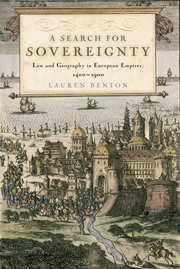Preface and Acknowledgments
Published online by Cambridge University Press: 05 June 2014
Summary
Several years ago, I mentioned to a friend that I had started working on a book about the history of European perceptions of oceans. I said it would take me only a year or two to research and write. I had come to this topic after reflecting on historians' reluctance to probe critically the spatial dimensions of early modern empires. We seemed often to assume that empires and states aspired to establish political and legal control over discrete, bounded territories. I thought we needed to learn more about how Europeans imagined unbounded, distant geographies and much more about the varied legal practices they relied on to project sovereignty into those spaces.
The sea seemed a logical place to begin. By definition, there could be no territorial control of the oceans, at least not in the ways conventionally imagined. This observation had already informed histories of the sea as a space trending from lawlessness to regulation under emerging international law. But it seemed to me that the usual narratives shifted attention away from the concerted efforts of empires to extend authority into the oceans, a process often carried out by mariners operating more or less on their own, beyond the range of close imperial oversight. To explore the history of the disorganized projection of imperial control over the oceans, I began by poring through accounts by and about pirates to find out whether and how even rogues might have acted as conduits of law.
- Type
- Chapter
- Information
- A Search for SovereigntyLaw and Geography in European Empires, 1400–1900, pp. xi - xviPublisher: Cambridge University PressPrint publication year: 2009



